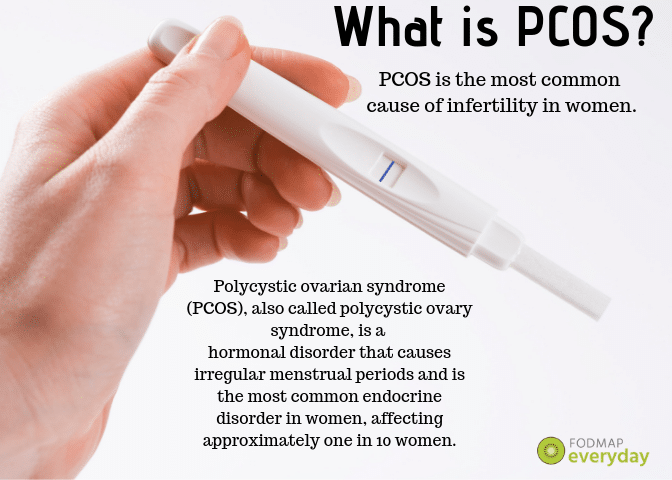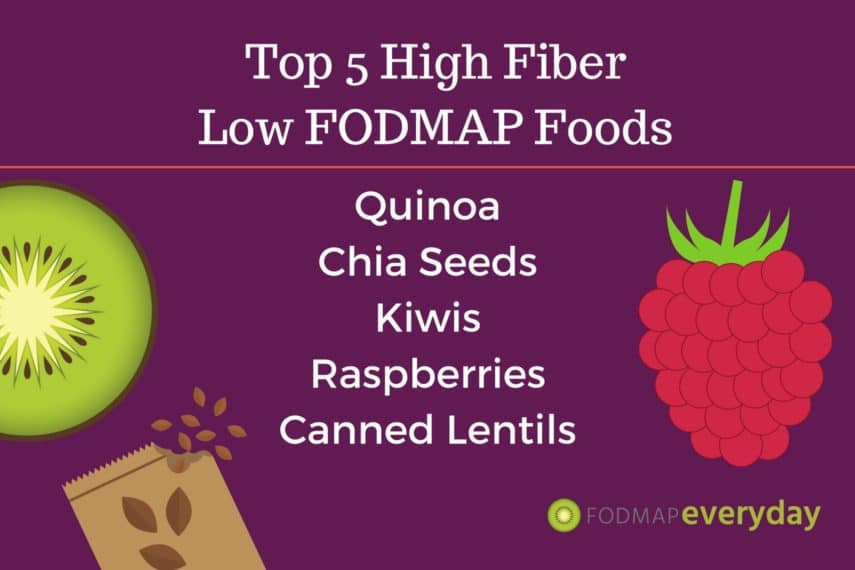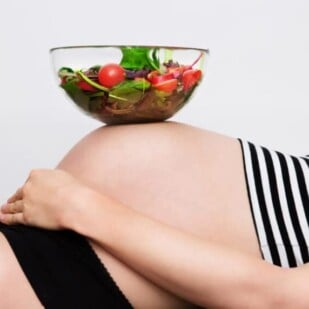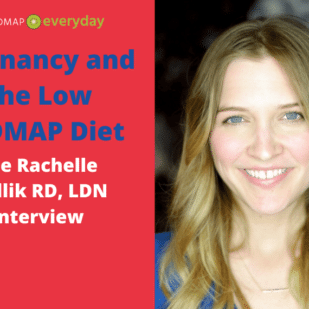PCOS, IVF, IBS & FODMAPs – What does it all mean?
EDITOR’S NOTE: We asked our Success Team RD Rachelle Mallik, who specializes in reproductive nutrition, and our colleague Mollie Tunitsky of FitFabFODMAP fame who was pregnant and navigating her IBS, to work together to bring a first-line look at what it is like to be expecting and dealing with health issues while navigating the low FODMAP diet. This is the first of four articles that presents both Mollie’s and Rachelle’s point of view in an effort to help others who are experiencing similar issues. Read the other articles in the series here.
Mollie’s Story
Last summer (2018) I decided to get off birth control after being on the pill for over 12 years. My husband Eugene and I weren’t ready to start trying but at the same time if it happened naturally we would be elated. Life got busy, Hurricane Harvey hit Houston where we live, my family moved in with us for 6 months and I completely lost sight that I should have been getting a period every month.
No Period, No Problem…?
Eight months of no period I thought was pretty great but when I went to my OBGYN, I was told that I should be getting my period by that point. His first thought for why I wasn’t getting my period was stress and possibly being underweight. I amped up my self-care but I wasn’t taking medication to force my period, and it wasn’t coming naturally.
My doctor was confident that he would be able to get my body to ovulate, which would be followed, by getting pregnant by taking an oral medication called Letrozole. Then after two rounds of Letrozole, a drug used to help women ovulate, my follicles began reacting, but instead of 2 to 6 follicles, I had over 30 follicles on each side, which is not what you want (at least not if you want to avoid being on the news for having multiples).
Given how hyperactive my body was to the drugs, my doctor wanted me to see a fertility specialist. After picking my jaw off the floor and giving myself a few days to let the news sink in, we met with my new fertility doctor.
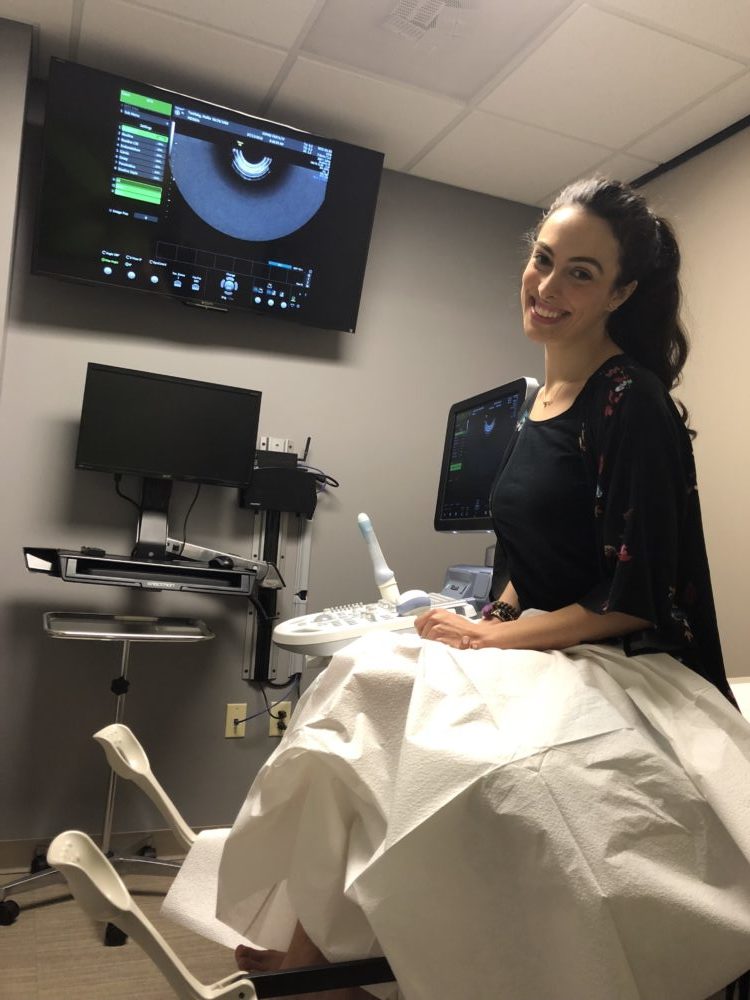
Know When To Consult A Specialist
The fertility doctor was immediately able to confirm that I did have PCOS (polycystic ovary syndrome), which I knew very little about. My doctor explained to me that by being on birth control I had actually been controlling my PCOS without even knowing it. The little I knew about PCOS was from articles in passing that described common PCOS symptoms as those that are overweight, suffer from acne or have excess facial hair. This was when my doctor explained to me that there is another version most commonly referred to as “skinny” PCOS.
IVF (In Vitro Fertilization) treatment can cause havoc on your body both mentally and physically. Not only was I absolutely exhausted and hormonal from the medication-forced fluctuations of the medications but they were also negatively affecting my gut. I had much more bloating and gas and I had to find stretchy and loose pants to wear to help with the discomfort. I later learned from my local dietitian that PCOS could cause stomach discomfort as well. I was getting hit from all fronts: GI discomfort from the IVF treatment and the PCOS.
A Dietitian’s Perspective: Rachelle LaCroix Mallik, MA, RD, LDN
Mollie’s story is similar to those I’ve heard before in my practice. As a dietitian specializing in reproductive nutrition along with the low FODMAP diet, I have worked with several women struggling with both PCOS and IBS. Some clients have come to me to address their IBS and others have come for their PCOS, and when reviewing their medical histories I’ve found out they have both IBS and PCOS. This led me to investigating the connection between the two conditions – are PCOS and IBS related?
What is PCOS?
Polycystic ovarian syndrome (PCOS), also called polycystic ovary syndrome, is a hormonal disorder that causes irregular menstrual periods and is the most common endocrine disorder in women, affecting approximately one in 10 women[1].
PCOS is usually diagnosed based on women having two out of the following three criteria:
- Irregular menstrual periods caused by anovulation or irregular ovulation,
- Elevated androgen levels (hyperandrogenism)
- Polycystic ovaries on pelvic ultrasound.
PCOS is the most common cause of infertility in women.[2]
Multiple Presentations of PCOS
Besides irregular periods, common physical symptoms of PCOS are facial hair or excess body hair (hirsutism), acne, and obesity. Not every woman with PCOS presents this way, however, and most of the clients I’ve worked with fall into the “lean” PCOS phenotype.
PCOS has been strongly correlated with insulin resistance and higher BMIs.[3] Often, women with PCOS are advised to lose weight to manage their condition, but this isn’t helpful for women who are considered to have “normal” or “underweight” BMIs. Additionally, vague advice to lose weight may also not be helpful advice for women in larger bodies, who may turn to restrictive diets rather than health-promoting behaviors. Regardless of weight, insulin resistance affects both “lean” and “overweight” women with PCOS, with a respective prevalence of 75% and 95% in one study.[4]
Is There A Relationship Between PCOS & IBS?
Both PCOS and IBS are relatively common conditions, affecting 5-12% of women and 10-20% of adults, respectively, with IBS being more prevalent in women. The cause of both of these conditions is complex and not entirely clear. It’s hypothesized that PCOS results from an interaction of genetic and environmental factors[5]. IBS appears to be related to alterations in gut motility and visceral hypersensitivity, but newer research suggests inflammation and changes in fecal flora (bacteria) may play a role[6].
Studies connecting PCOS and IBS are very limited – at the time of this writing, I was only able to find one small study published in 2010 that found an association between the two conditions. The results showed a 41.7% prevalence of IBS in women with PCOS compared to 10.3% of women in the control group.[7] The researchers also found women in their study with PCOS and IBS had higher BMIs and percent body fat. The study authors note that an association between PCOS and IBS does not mean there’s a common underlying cause, but they hypothesize hormonal changes may play a role.
Unfortunately, I was unable to find additional research on these findings. Given the limited research examining the relationship between PCOS and IBS, along with the complexity of both conditions, it’s difficult to pinpoint a relationship between the two. However, the good news is that there are nutrition and lifestyle interventions that can improve symptoms for both conditions.
How Can You Address Both IBS & PCOS With Nutrition?
The low FODMAP diet has been shown to improve IBS symptoms in about 75% of individuals. The Elimination Phase, which is often mistakenly thought to be the entirety of the diet, is not meant to be a long-term phase. The three phases (Elimination, Challenge and Integration) are meant to help you determine what foods contribute to your symptoms and to personalize a dietary approach that works for you and your symptoms.
For managing PCOS, research shows foods with a lower-glycemic index and a Mediterranean style, anti-inflammatory diet can be beneficial. Fiber plays many important roles in human health, and in women with PCOS fiber helps stabilize blood glucose and reduce insulin response. Since many high fiber foods are often high in FODMAPs, it’s important to include a variety of low FODMAP, fiber-rich foods. (Read about our favorite Low FODMAP Fiber sources here.)
Ideally you should work with a registered dietitian (RD) who has experience in PCOS and IBS. RDs can guide you through the three-phases of the low FODMAP diet to determine what foods affect your GI symptoms, and then assist in personalizing the diet and making sure your diet is meeting your needs.
It should be noted that women with PCOS have an increased risk for eating disorders[8][9]. Since the low FODMAP diet is an elimination diet and can result in overly restrictive eating for some people, it’s even more critical to work with a dietitian to address both conditions with nutrition in a safe way that promotes physical and mental health. Remember the goal of the low FODMAP diet is to have the least restrictive diet that you can tolerate.
Looking for a low FODMAP experienced Registered Dietitian? Find one here in our Global Registered Dietitian Directory.
If You Have PCOS and IBS and Are Trying To Conceive
If the low FODMAP diet is the best approach for you, it’s preferable to complete the Elimination and Challenge phases prior to trying to conceive for a few reasons:
- If you do get pregnant, you may experience GI symptoms that could affect the results of the diet. You may be able to get through Elimination and Challenge Phases (depending on how long it takes to conceive), but you may also need to stop and not complete all phases of the low FODMAP diet.
- If you are undergoing infertility treatments with ovarian stimulation, such as intra-uterine insemination (IUI) or in vitro fertility (IVF), it’s common to experience bloating, which may also cloud the results of FODMAP Elimination and Challenge Phases.
- You want to make sure you’re meeting the nutrient needs for preconception and prenatal health despite dietary restrictions. Again this is why working with an RD would be helpful.
Through Mollie working with her fertility doctors and local dietitian she was able to manage her PCOS and IBS symptoms while going through fertility treatment and later pregnancy.
You might also be interested in Rachelle’s article on Postpartum Nutritional Needs, Morning Sickness and Breastfeeding while on the low FODMAP diet.
References
[1] Barbieri, R and Ehrmann, David. Diagnosis of polycystic ovary syndrome in adults. UpToDate (Updated 2018).
[2] Azziz R et al. The prevalence and features of the polycystic ovary syndrome in an unselected population. The Journal of Clinical Endocrinology & Metabolism Volume 89, Issue 6, 2745–2749 (2004).
[3] Ezeh U et al. Association of fat to lean mass ratio with metabolic dysfunction in women with polycystic ovary syndrome. Human Reproduction 7, 1508–1517 (2014).
[4] International evidence-based guideline for the assessment and management of polycystic
[5] Rosenfield, R. Etiology and pathophysiology of polycystic ovary syndrome in adolescents. UpToDate. Updated 2018.
[6] Wald, A. Pathophysiology of irritable bowel syndrome. UpToDate. Updated 2018.
[7] Mathur, R et al. Polycystic ovary syndrome is associated with an increased prevalence of irritable bowel syndrome. Digestive Diseases and Sciences. Volume 55, Issue 4, pp 1085–1089 (2010).
[8] Dokras, A et al. Androgen Excess – Polycystic Ovary Syndrome Society: position statement on depression, anxiety, quality of life, and eating disorders in polycystic ovary syndrome. Fertility and Sterility. Volume 109, Issue 5, Pages 888–899 (2018).
[9] Lee, I et al. Increased risk of disordered eating in polycystic ovary syndrome. Fertility and Sterility. Volume 107, Issue 3, Pages 796–802 (2017).
